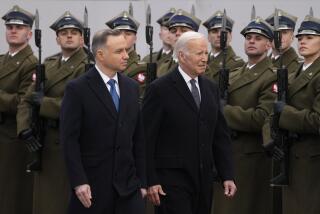To the Victors Go the Spoils of Reconstruction
- Share via
KUWAIT CITY — When the first wave of U.S. forces secured Iraq’s southern oil fields and ports, British, Australian and Polish soldiers were at their side, executing daring raids and taking heavy fire from Saddam Hussein’s army.
Now it’s payback time.
As Bechtel Group Inc., Halliburton Co. and other U.S.-based prime contractors award the first wave of subcontracts for the reconstruction of Iraq, British and Australian firms are among the early winners, and Polish companies are said to be on the short list for future deals.
Officially, the Bush administration and its private-sector collaborators say the competition for subcontracts is open to all comers, and awards will be made to the most qualified companies without respect to their country of origin.
But in corporate suites and foreign capitals -- and in the swank Kuwaiti hotels that have become the nerve centers of postwar reconstruction -- the word is making the rounds: When it comes to rebuilding Iraq, America’s military partners are first among equals.
“We’re certainly encouraging our contractors to hire coalition partners to do subcontract work,” said one U.S. official directly involved in the reconstruction effort, who spoke on condition of anonymity.
The government may not be dictating the choice of subcontractors, but a little encouragement can go a long way in contracting circles.
“The general hope is that companies whose countries fought in the war will be the ones who participate in the economic reconstruction,” said Equity International Inc. President William Loiry, who is coaching would-be contractors on opportunities in Iraq. “I don’t know what the definition of fair share would be, but I think they will wind up with the majority of contracts and subcontracts.”
They have certainly fared well so far.
When the U.S. Agency for International Development picks a location for its reconstruction headquarters in Baghdad, the site preparation work will be turned over to Crown Agents, a British firm founded in 1833 to procure goods for colonial outposts. Crown was hired by International Resources Group, a U.S. consulting firm that won a $7-million prime contract to help USAID plan and manage reconstruction projects.
Other British firms are getting in on the postwar action, too.
Weir Group, Scotland’s biggest engineering firm, received a six-figure subcontract from Halliburton’s Kellogg Brown & Root subsidiary to assess the state of oil pumping equipment in southern Iraq. The firm hopes the evaluation work will lead to bigger assignments to repair and upgrade Iraq’s antiquated oil infrastructure.
“Yes, we would be interested, obviously,” said Weir spokeswoman Helen Walker, who noted that some of the oil pumps were installed decades ago by a firm eventually acquired by Weir. “We’ve worked with Halliburton in the past. We know the area. We’d like to think it’s our expertise and our knowledge that have allowed us to carry out this assessment.”
One of the more forthright examples of private-sector coalition-building is a joint venture between Amec, Britain’s biggest engineering and construction firm, and Orange County-based Fluor Corp., one of its main American rivals. The firms intend to submit a joint bid on a big long-term contract to rebuild the Iraqi oil industry. If the U.S. Army Corps of Engineers accepts their offer, Fluor would hold a 51% stake and Amec 49%, satisfying government requirements that prime contracts go to U.S. majority-owned ventures.
Fluor spokesman Jerry Holloway said Fluor and Amec have been partners in previous projects around the world, and their prospective collaboration in Iraq involves more than postwar geopolitics.
“Obviously, the fact that it’s a British company is not lost on us,” Holloway said. “We’re not going to shyly demur on the obvious British-American nature of this team. But it’s not a new, knee-jerk reaction to the political environment. If Amec didn’t have what it has in terms of resources and experience, it would be unlikely we would see any reason to go into this kind of arrangement.”
Australia contributed about 2,000 military personnel to the war. Its navy provided gunfire support to coalition troops in southern Iraq and helped clear mines from the port of Umm al Qasr. Its special operations troops participated in an early clandestine attack, ambushing Iraqi soldiers at Scud missile sites before the first U.S. bombs were dropped in Baghdad.
Now, as the coalition turns its attention to repairing the damage caused by 25 days of war and 25 years of neglect, Aussies and Americans are again working side by side.
SkyLink Air & Logistical Support, a U.S. firm holding a $10-million prime contract to manage Iraqi airports, has farmed out part of the work to Patrick Corp. of Australia.
Patrick personnel are already on the tarmac determining what needs to be done to restore operations at Baghdad’s main airport.
Although it is the first time SkyLink has ever partnered with Patrick, a SkyLink official said the decision was not made in response to U.S. government pressure.
“It’s purely a need point of view,” said Mike Douglas, SkyLink’s liaison officer on the ground in Baghdad. “They were flexible enough to come under these conditions and do what’s amounting to a very good job.”
In Australia, however, the relationship is seen as a harbinger of future deals for other firms. About 170 Australian companies participated in a reconstruction conference earlier this month in Sydney, where Foreign Minister Alexander Downer told reporters “our companies are feeling confident they’re going to get a number of contracts.”
Poland’s contribution to the Iraq offensive was relatively small, but the 200 or so military personnel it sent to Iraq were involved in some of the key operations in the early days of the war. Polish commandos helped U.S. Navy Seals seize two offshore oil terminals, a pair of pumping plants and a metering station.
Since the war’s end, Polish government and private-sector officials have been aggressively seeking reconstruction work and expressing confidence that their support for the U.S. military campaign would pay off.
“Poland’s active participation in the coalition ... opens up new possibilities for Polish companies to participate in the rebuilding of Iraq,” the government said in a statement.
“We do not hide the fact that our support for the United States should be helpful in securing contracts for our companies,” Polish Infrastructure Minister Marek Pol told reporters in Athens last month, according to Reuters.
Among the likely participants is Rafineria Gdanska, a state-owned oil company that will soon be privatized. RG officials have been discussing a possible reconstruction subcontract with representatives of Kellogg Brown & Root, the Halliburton subsidiary that has been tapped to get Iraq’s oil sector up and running again.
“The Americans pay money and they will make decisions,” RG President Pawel Olechnowicz told the Oil & Gas Journal. “That they include Poland in part of the project is a fact.”
Denmark, which deployed a submarine to monitor Iraqi intelligence and provide early warning support during the war, could also reap postwar rewards.
A.P. Moeller, a Danish oil and shipping firm, said it had been told by Denmark’s foreign minister the U.S. is interested in its potential participation in reconstruction. No deal has yet been struck, but the company said further discussions are possible.
“Other Danish companies with other expertise have been approached,” Moeller Vice President Jette Clausen said. “I think it was a general approach to the Danish government. Being part of the coalition, of course they’ll be asked before somebody else.”
U.S. officials have not released a list of reconstruction contractors and have referred questions about their selection to the prime contractors. Under the law, contracts awarded by USAID must go to U.S.-owned firms, and the government cannot dictate the choice of subcontractors. Administration officials have said they anticipate that roughly half of the subcontracts would be awarded to foreign companies.
Bechtel, which received a $680-million prime contract to manage infrastructure repairs in Iraq, insists that its choice of subcontractors is not influenced by politics.
“There is no preference for contractors from any individual country or group of countries,” Bechtel spokesman Howard Menaker said in Washington.
Loiry, whose Washington-based investment firm organized a reconstruction conference that attracted representatives of 400 companies from 25 countries, said the U.S. government does not appear to be forcing prime contractors to hand out work to firms from coalition countries. But he said the widespread expectation of preferential treatment may become self-fulfilling.
“Their perception they will get the contracts will help make that a reality, because those are going to be the companies and the countries that are more aggressive in attending the conferences and making the connections and going after the subcontracts,” Loiry said.
Only a dozen or so subcontracts have been announced publicly, and it is not known how many ultimately will go to firms based in coalition countries.
Besides British and Australian firms, companies based in Saudi Arabia and Kuwait have been among the initial subcontract winners.
So far, no French companies have made the list.
More to Read
Inside the business of entertainment
The Wide Shot brings you news, analysis and insights on everything from streaming wars to production — and what it all means for the future.
You may occasionally receive promotional content from the Los Angeles Times.










